Geopolitical tensions, rising tariffs, cost volatility and expanding due diligence regulations are making it increasingly difficult for procurement and business leaders to stay competitive and meet shifting market demands. Supply chains are being constantly reshaped in response to more frequent, unpredicatable and severe disruptions. Even the most mature supply chain risk and due diligence programs must evolve to build greater resilience and keep pace with this new reality.

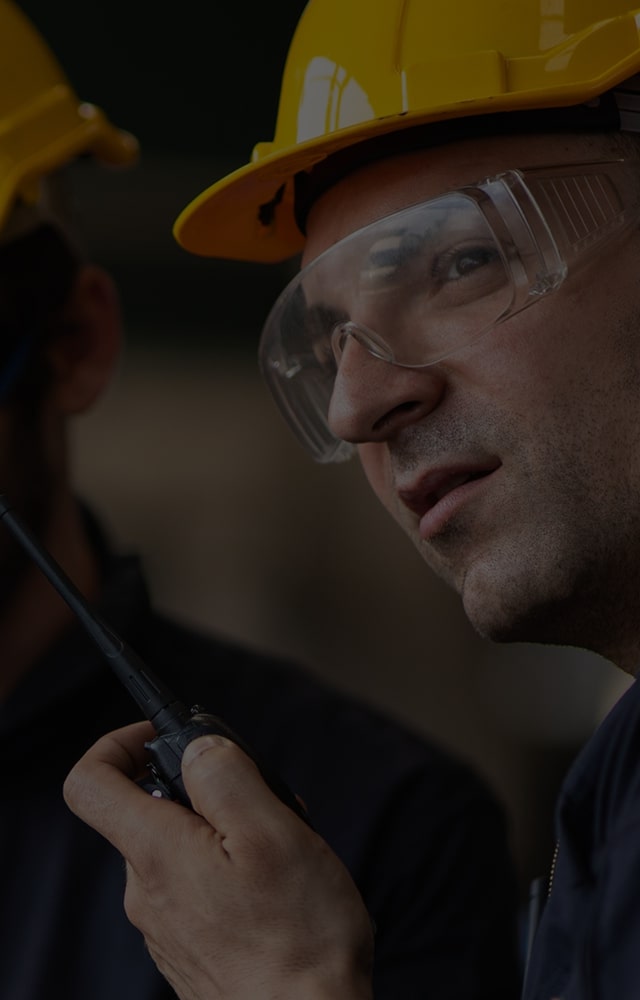
A Four-Step Blueprint for a More Resilient Supply Chain
Supercharging for resilience: A four-step framework for action
As the risk landscape grows more complex, reactive approaches fall short. Building resilience now requires a proactive, integrated strategy — one that uses advanced digital tools to deliver the data and insights procurement and sustainability teams need to collaborate effectively. The four-step framework to the right provides a clear path forward: enabling smarter risk mapping and verification, deeper supplier engagement to drive continuous improvement, and seamless monitoring and reporting. Whether your sustainable procurement program is in its early stages or well-established, these actionable steps can help you uncover more risk, strengthen due diligence and protect your supply chain from rising disruption.

In 2024, only
34%
of large companies (1,000+ employees) rated by EcoVadis conducted a risk mapping of their suppliers before assessments or audits.

In 2024,
61%
of large companies (1,000+ employees) rated by EcoVadis conducted basic supplier assessments through, for example, SAQs without validation.

Approximately
43K
companies reporting on their GHG emissions through the EcoVadis platform.

Risk mapping & identification
Supply chain disruptions are growing more frequent and severe, with third-party failures now the leading cause. Meanwhile, ESG- related incidents — like labor and human rights violations — are rising amid mounting regulatory and stakeholder scrutiny, increasing operational and reputational risk. However, our Barometer report with Accenture found that only 50% of companies have visibility into even half of their tier 1 suppliers — and just 25% into tier 2.
With half of all disruptions occurring beyond tier 1 and ESG risks even more concentrated in deeper tiers, full supply chain visibility is now a strategic and competitive imperative.
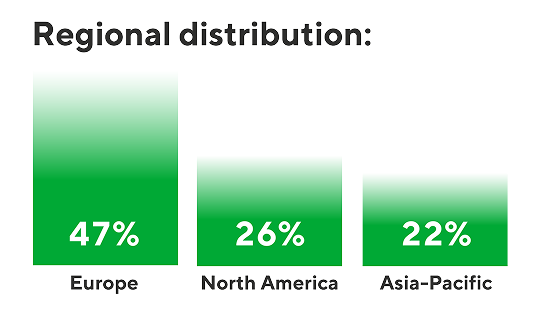
Risk verification
Identifying supplier risk is only the first step: verifying that any risks uncovered are real and material is essential for building true resilience. Yet many companies still rely on do-it-yourself or internally managed programs that lack the flexibility, depth
and resources needed to generate meaningful insights. The data these tools generate is often static, difficult to integrate and poorly aligned with procurement workflows, leaving buyers with blind spots and suppliers with little feedback or incentive to improve.
Our Barometer study found that leaders are twice as likely to engage both strategic and high-risk suppliers using advanced assessment tools.
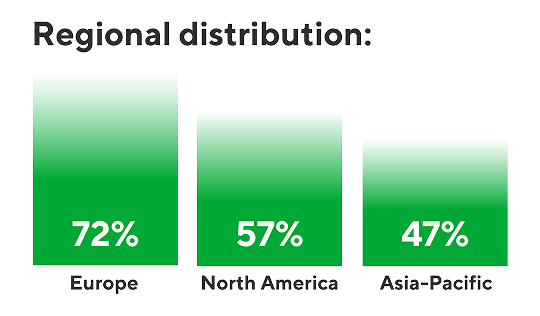
Risk mitigation & prevention
Once risks are verified, the next step is targeted supplier engagement. This is where due diligence becomes transformational — not only reducing today’s risk exposure but also building the foundation to prevent future issues. A recent report found that 74% of global companies have already had to respond to supply chain due diligence requirements in some form, and the EU’s upcoming CSDDD will only increase that number. But the benefits go beyond compliance readiness. Companies with an effective due diligence process are better equipped to strengthen supplier relationships, improve performance and build resilience.
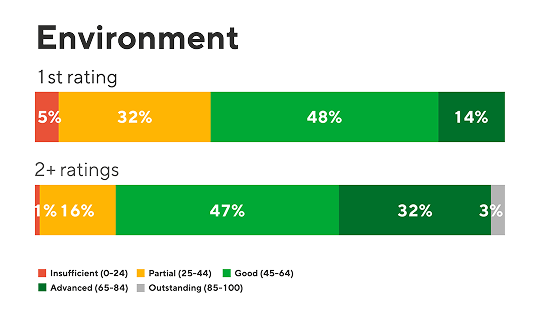
Monitoring & reporting
Continuous monitoring and reporting are essential for effective ESG risk management, disclosure and long-term resilience — but many companies are still behind. According to a recent survey, just 17% of large US firms collect supplier ESG data more than once a year, compared to 50% in the EU. Closing these gaps requires smarter, centralized systems
that streamline data collection, enhance data accuracy and deliver real-time insights. With the right tools, companies can meet compliance demands, improve transparency and drive continuous supplier performance improvement at scale.
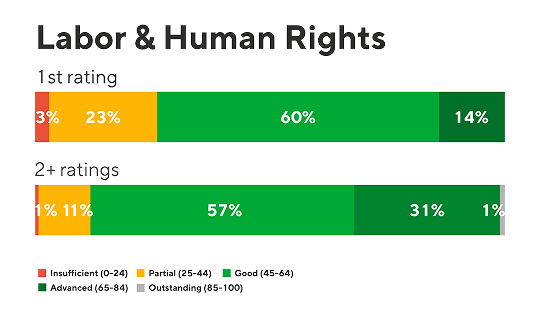
The steep cost of supply chain disruptions and low ESG visibility
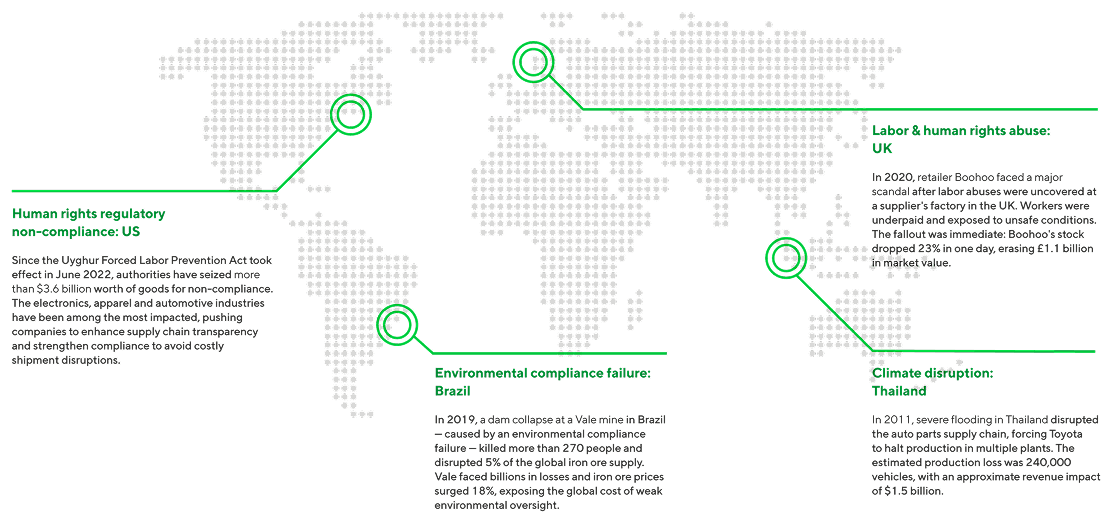
Leading companies are using EcoVadis solutions to build resilience
0
EcoVadis IQ has propelled our sustainability and risk management, providing the path to a more resilient future through sustainable procurement.
Dustin Deal Director,
Security, Risk & Strategy


The Carbon Action Manager helps our suppliers to have all their carbon data in one tool, enabling SNCF to reach our decarbonization targets.
Yann Mazloum Director of decarbonization and circular economy of procurement

Ready to get started?
